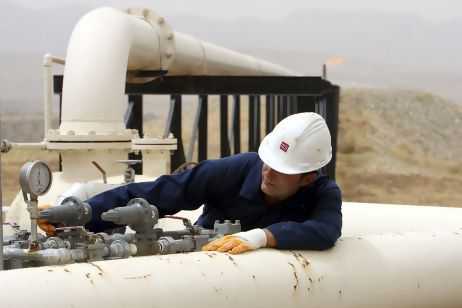ISTANBUL // Turkey is pushing ahead with plans to extend economic cooperation with Iraq’s Kurdistan region, brushing aside warnings from the United States that this approach could lead to the disintegration of the Iraqi state.
Related
A Syrian rebel fires shots in the air as mourners carry the body of Mohammed Hafar, 20, during his funeral in the northern Syrian town of Azaz on October 29, 2012. Mohammed Hafar and his brother were killed during clashes between Kurdish militiamen and Free Syrian Army fighters near the village of Al-Kastal close to the border with Turkey, amid rising communal tensions. AFP PHOTO/PHILIPPE DESMAZES *** Local Caption *** 778087-01-08.jpg
■ Kurds talk of intervention in Syria, raising danger of escalation
■ Kurd-Turkish clashes feared along Syrian border
Comment Kurdish killings in Paris will not derail Ankara-PKK peace

Iraq’s Kurdish region had become so important to Turkey, economically and politically, that Ankara was willing to risk tensions with the US, its most important ally, said Celalettin Yavuz, an analyst at a think tank in the Turkish capital.
Taner Yildiz, Turkey’s energy minister, yesterday said that oil imports from northern Iraq to Turkey by truck had resumed after a pause of several weeks for technical reasons.
He said Turkey was determined to sell refined-oil products to Iraqi Kurdistan, the state-run Amnadolu news agency reported.
Oil exports from northern Iraq to Turkey have angered the central-Iraqi government. It said the trade was illegal, which Ankara denies.
Mr Yildiz stressed that Turkey was also buying oil from southern Iraq, because doing otherwise would be “discrimination”.
US officials are concerned that Turkey’s strained ties with Baghdad could have implications for the rest of the region.
The Kurdish Regional Government (KRG) in northern Iraq said last week it planned to press ahead with building an oil-export pipeline to Turkey. “We want to have an oil pipeline to ourselves,” said Ashti Hawrami, the Iraqi Kurdish minister for natural resources.
Crude from the Kurdistan region used to be shipped to world markets through a Baghdad-controlled pipeline to Turkey, but exports via that channel dried up in December, from a peak of around 200,000 barrels per day (bpd), due to a row with Baghdad over payments.
Recep Tayyip Erdogan, the Turkish prime minister, said his country was not obliged to wait for a new agreement between the central Iraqi government and the KRG over oil exploration and export rights, even though Washington wanted Ankara to be cautious.
“Our economic relations are getting broader, despite everything, including America,” Mr Erdogan said last week, referring to the KRG.
Mr Erdogan, who has been careful to develop close relations with the US, freely acknowledged tensions with Washington over the issue.
“America says: ‘What you are doing is wrong,’” Mr Erdogan said. “We are saying: ‘No, Iraq’s constitution allows it.’”
The present constitution, drawn up after the US-led invasion in 2003, gave Iraqi Kurds the right to more than 18 per cent of the country’s oil reserves, he added.
Mr Erdogan’s remarks followed a public warning by Francis Ricciardone, the US ambassador to Ankara. Speaking on February 5, he said a failure by Turkey and the central Iraqi government to deepen their cooperation would be dangerous for the whole region.
“There could be more violent conflict in Iraq and the forces of disintegration within Iraq could be emboldened,” he said.
Mr Yavuz, the deputy director of the Turkish Centre of International Relations and Strategic Analysis, said the KRG was a priority for Turkey despite US concerns.
On the political front, Ankara was trying to secure the support of the KRG for efforts to end the Kurdish conflict in Turkey, he added.
The Turkish intelligence service had been negotiating with Abdullah Ocalan, the jailed leader of the Kurdistan Workers’ Party, a rebel group that has been fighting Ankara since 1984.
“The KRG is indispensable for Turkey,” Mr Yavuz said.
That outlook collides with US interests in the region. “The USA wants to secure the Gulf and keep Iran out,” he added.
He said Iraq was drifting towards Iran, despite the US launching the 2003 invasion that had toppled Saddam Hussein, claimed the lives of several thousand US soldiers, cost trillions of dollars and battered America’s image in the region.
“So one may ask: why did they go into Iraq in the first place?” said Mr Tavuz. “This is what makes the US concerned. By turning away from Turkey, Iraq is turning away from the West and towards Iran.”
About 90 per cent of Turkish exports to Iraq went to the Kurdish region, he said. KRG oil and gas could help to reduce Turkey’s dependence on energy imports from Iran and Russia.
The oil-exports row has also heightened existing tensions between Mr Erdogan’s government and Iraq’s prime minister, Nouri Al Maliki.
Turkey has accused Mr Al Maliki, a Shiite, of trying to centralise power in his hands, while Mr Al Maliki has said predominantly Sunni Turkey was meddling in Iraq’s internal affairs and was a “hostile state”.
tseibert@thenational.ae
* With additional reporting by Reuters
via Turkey builds closer oil links with Kurds, angering US – The National.

Leave a Reply